Please! No Puppies under the Christmas Tree

Dog breeds are an individual choice
If you’ve spent any time at all reading our breed profiles, you know that different breeds have very different personalities. From the independent Chow Chow to the always-underfoot Golden Retriever, different breeds are known for different traits. And within each breed, there is variability between individual dogs.
Choosing a puppy means spending enough time with potential dogs to find one that matches the person’s lifestyle and temperament. A very active person might like a Labrador Retriever, but the energy of that type of dog might be way to much for someone who leads a more sedentary life. Small children might love a Great Dane puppy, but when the dog turns out to be huge a mere six months later, it could be a scary situation.
Even something as simple as the color of the dog may make a difference to the person for whom you are buying. For example, if your girlfriend has all-white furniture in her home, she might not appreciate your buying her a red dog that sheds. And some people are simply scared of big black dogs, even though color doesn’t have anything to do with temperament.
Find another way to teach responsibility
One of the biggest reasons why parents give in to their child’s request for a puppy is because they believe that having a dog will teach the child responsibility. Let’s think about that for a moment. If you can’t even get your son to recognize that the garbage can doesn’t empty itself, how will you get him to remember to feed and walk the dog? If your daughter can’t see past the text window on her cell phone, what makes you think she will take the time to train a dog?

Dogs, especially while they are puppies, are very high maintenance. Do you really expect your daughter to get up in the middle of the night before an exam to take the dog outside to the bathroom? Will your son, who throws up when he sees blood, be able to clean up dog poop and vomit?
Until your children understand that a puppy is a living, breathing being with needs as well as wants, it’s not fair to the dog to expect all of his or her care to come from a kid. (It’s not fair to a young child, either.)
Unless you plan on taking personal responsibility for the dog, it’s better not to surprise your children with a puppy under the tree.
Christmas Day is crazy!
Have you ever considered Christmas morning from a small puppy’s point of view? You have taken this very small animal from his mother and placed him in a box where it is dark and scary. Then, all of a sudden the box is opened and bright twinkling lights assault his eyes while the shrieks of children invade his ears. He is picked up – none to gently – and passed from person to person, and when he pees on one of them, he is scolded. Then he is taken outside in the cold, where he has no idea what is expected of him.
By the time he comes back in, the children have begun ripping open their other packages, but when he chews on the ribbons, he again gets scolded. All he wants is a place where he can lie down and hide, but that big cat took the best place in the house – on the heating vent, and she hisses at him whenever he comes near her.
He wanders out into the kitchen, where something smells heavenly, but he is not allowed to have any of it. The doorbell rings, bringing in more loud people who pass him around, more food he is not allowed to eat, and more presents with ribbons he can’t play with.
Does that sound like fun to you? It’s probably not for the puppy either. Much better to get a puppy when your house is calm and at least one person has the time puppies need to have devoted to them.
Dogs live 12 – 15 years
If you buy someone a puppy for Christmas, keep in mind that most dogs live at least ten years, and some live to 15 years or even longer. Is the person for whom you’re thinking about buying a puppy going to be in it for the long haul? Even after the puppy has chewed up every shoe in the house and peed on every square inch of new carpet?

If you’re thinking about buying a puppy to impress a girl, think again. My son’s girlfriend recently got a new puppy, and was doing a pretty good job of being a responsible pet owner. Unfortunately, that meant she didn’t have much time for my son, and he ended up breaking up with her because he felt he had become second fiddle. He knew this dog was likely to be “in the way” (his words) for at least the next ten years, and he couldn’t take it.
Although dogs become easier to care for as they get out of puppyhood, they still need daily walks or some other form of exercise, food, water, shelter, and lots of love. Unless you know for sure that the recipient is capable of that level of commitment, a puppy under the tree is a very bad idea.
The excitement of a puppy wears off quickly
Particularly with children, the excitement of Christmas wears off fast, sometimes even before they go back to school. After they’ve spent a few days playing with each of their gifts, they’re ready to move on to something else. Unfortunately, the puppy won’t understand this. He or she still wants to be the center of the child’s universe, regardless of how many X-box games were included with the game console.
It’s far better to introduce a puppy to the family at a calmer time, when all the focus can be on the dog rather than on the “busy-ness” of the holiday season. Training and socializing a puppy can be all-consuming chores, and no one really has time to do this when there are so many other things to do. Returning unwanted gifts, preparing and eating festive meals, writing thank-you notes, contacting far-away loved ones, and un-decorating the house all take up time after Christmas Day, but the puppy’s needs won’t diminish. He or she will become just one more chore to take care of.
Oooh, baby, it’s cold outside!
In many regions, Christmas means cold temperatures and snow. Have you given any thought to how you will housebreak a puppy when it’s so inhospitable outside? Having house-trained dogs during both the winter and the summer, I can tell you it’s much easier in the summer.
You will be taking your puppy outside nearly every two hours around the clock. Do you really want to mess with that when it’s so cold you wouldn’t even take out the garbage? And what about the puppy? His little feet may not appreciate the cold, and if the snow is very high, it may make it hard for a small pup to squat.
What about the free puppies that are always advertised around the holidays?
There are many reasons not to try to stretch your Christmas budget by getting a free dog. First of all, there is no dog that can truly be had for free. Sure, you may be able to procure the dog at no price, but your recipient will have to buy food, dog dishes, a leash and collar, grooming supplies, and veterinary care. In the first year alone, most people spend close to $500 for a new dog.
The next biggest reason for not getting a “free” puppy for Christmas is that you generally get what you pay for. Unscrupulous breeders know that everyone’s heart just melts at the thought of a puppy under the tree, so they try to unload their “lower quality merchandise” by giving away the dogs that haven’t been sold. It may be that the dog is sickly or simply not show quality. As long as the breeder has the puppy, he has to feed him or her and provide veterinary care. If the breeder knows the puppy is not fit for sale, it saves him money to simply give the dog away; and he knows he can find someone to take the dog, especially just before the holidays.
What can I give instead of a puppy to the animal lover on my list?
If you are dead-set on giving a dog, check out local shelters and rescue organizations where you might find an older dog who is already house-broken, trained, socialized, and used to the commotion of a big family. In addition, most shelter dogs are current on their shots and have already been spayed or neutered, cutting down on the expense associated with having a dog in the family.
Better yet, give your child a home-made gift certificate promising a puppy in three months, if the child works at a shelter every Saturday for at least two hours. This allows the child to see what having a dog entails, and allows him or her to learn about the different breeds, and maybe to even fall in love with a shelter dog who will eventually come home.
If the person on your list loves all sorts of animals, consider buying a zoo membership or even adopting an animal at your closest zoo. Depending on the zoo and on the amount of money you give, there may be opportunities to visit with the animals in the evenings when they are most active or even to help with feeding and care.
Doggies Den: Latest Articles
 Homemade Thanksgiving Treats for Your Dog
Homemade Thanksgiving Treats for Your Dog
NUTRITION We all want to include our dogs in our holiday celebrations, but hopefully, you're aware that sharing table scraps with your dog isn't always the best idea.
 Keeping Your Dog Safe during the Summer Months
Keeping Your Dog Safe during the Summer Months
HEALTH Summer is coming on fast, so it’s time to plan how you will keep your dog safe and healthy through the lazy, carefree, warm days.
 Vaccination Time Again-Keeping Your Puppy Healthy
Vaccination Time Again-Keeping Your Puppy Healthy
DOG HEALTH So you have your new puppy picked out. There are quite a few shots, treatments and examinations that will keep the newest member of your family healthy.
 Canine Thanksgiving Feast
Canine Thanksgiving Feast
NUTRITION With the wide variety of food at Thanksgiving dinner, chances are you'll want to give your dog something special, too. If you're contemplating what to feed your dog for the holiday, here is a guide to a great Canine Thanksgiving Feast.
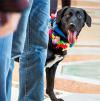 Dog Walking Tips Every Owner Should Know
Dog Walking Tips Every Owner Should Know
DOG FUN Walking your dog is not only crucial to keeping him healthy and happy, it strengthens the bond between your canine friend and his caregiver. There are a lot of obstacles out there. Don’t forget these simple tips to keep your walk fun and safe in the outside world.
 The Benefits of Physiotherapy for your Dog
The Benefits of Physiotherapy for your Dog
HEALTH The same techniques that physiotherapists use to treat a variety of injuries and conditions in humans have been adapted to suit animals with great success. Family pets, show dogs, and working dogs can all benefit greatly from physiotherapy. Dogs whose activities involve a lot of agility are especially susceptible to the types of problems that physiotherapy can address.
 The Decision- Adding a Dog to Your Family
The Decision- Adding a Dog to Your Family
FIRST TIME OWNERSBringing a dog into your family is a decision where many people don’t realize it’s magnitude until after they have the dog. There are a number of things that you need to research before you decide to purchase a dog, and it starts right in your own home.
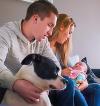 Bringing Your Dog Into Your New Baby's Life
Bringing Your Dog Into Your New Baby's Life
HEALTH Many believe that a dog and a new baby cannot happily coexist, so therefore the dog has to go. This is not necessarily the case.  A new baby does not mean you have to abandon your dog.

Doggies Den:
Most Popular Articles

Dog Pregnancy Symptoms
HEALTHIf you suspect your dog might be pregnant, check out part one in this series on pregnant dogs, where we cover pregnant dog symptoms.
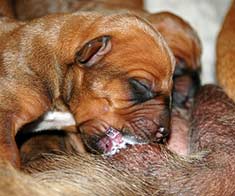
Dog Birth
HEALTHIn the third article of our dog pregnancy series, we look at the wonderful, but messy, process of bringing newborn puppies into the world.

Indoor Dog Potties
DOG PRODUCTSIt's been a long day at work. You were so busy, you didn't even take time to eat a sandwich, let alone run home to let your dog out. You're on your way home, knowing the poor dog is crossing his or her legs by now, when your car breaks down, delaying you even further. Can't somebody make this easier?
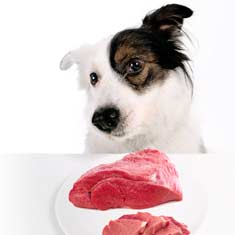
Your Dog’s Digestive System
PHYSIOLOGYEver wonder why your dog eats so fast? Or why he eats gross things? Or why he gets sick to his stomach? Or why his waste stinks so bad? Some of these things are normal, some are not.

Canine Respiratory System
BREATHINGThe basic function of your dog's respiratory system is to bring oxygen in to and remove carbon dioxide from the body. Knowing the symptoms of respiratory diseases can help you help your stay healthy.
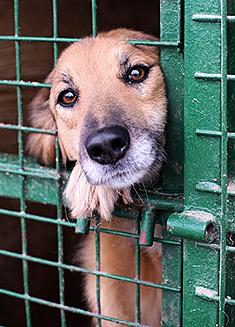
Shelter Dog Adoption Tips for Success
ADOPTION Are you intimidated by the prospect of "rescuing" a dog from a shelter? One reason that you may be wary of adopting a dog from a shelter is not knowing how to choose. Adopting a dog from a shelter can be a rewarding process, if you're prepared to do a reasonable amount of research.
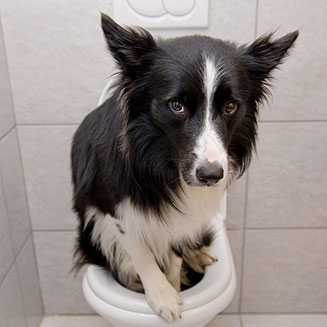
Canine Urinary Tract Infections
SYMPTOMS AND TREATMENTDoes your dog seem to be having trouble relieving his or her bladder? Learn how to recognize the signs of urinary tract infections and how to treat them before they spread.
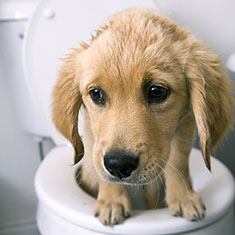
What to do for Dog Diarrhea
SYMPTOMS AND REMEDIESIf you have dogs in your house for any length of time, you have likely experienced at least one bout of dog diarrhea. Beyond the pain in the tuckus involved in cleaning up the mess, you should know what causes diarrhea, and when it's important to see the vet.

What to do for a Dog Bite
DOG BEHAVIOR Getting bitten by a dog can be scary, and you may be tempted to run around in circles for a while, trying to figure out what to do. Here's our guide to help you manage the situation.
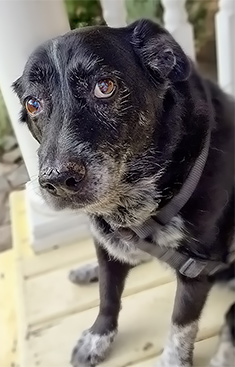
Top Ten Tips for Living with a Senior Dog
DOG HEALTH Bringing home a new puppy is so exciting, but it doesn’t take all that long for your exuberant puppy to grow into a senior dog who may have special needs. Here are the doggies.com top ten tips for taking care of your companion who has been with you through so much.
